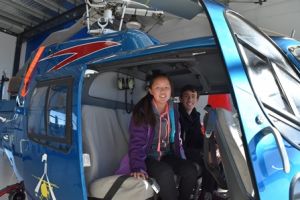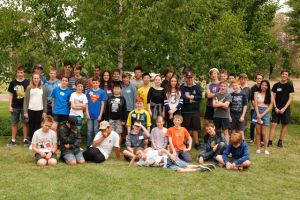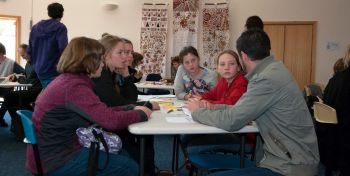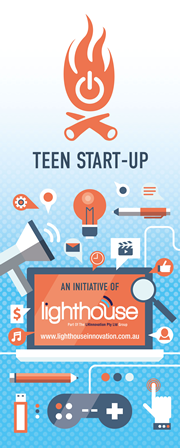Education
STEM aviation camp takes flight these school holidays
 Part teen business competition and part aviation holiday camp, Aviation Teen Start-Up camp at Canberra Airport is the perfect spot for your teen who is looking for a fun and challenging aviation experience during the school holidays.
Part teen business competition and part aviation holiday camp, Aviation Teen Start-Up camp at Canberra Airport is the perfect spot for your teen who is looking for a fun and challenging aviation experience during the school holidays.
Perfect for young people who are fascinated by airports and airplanes, Aviation Teen Start-Up provides a great opportunity for rich learning in science, technology and engineering. The innovation competition, for 11-to 16-year-olds, is being held on the 11th and 12th of July at the Canberra Airport. With a focus on aviation and aerospace innovation, a highlight of the competition is the behind-the-scenes tour of Canberra Airport.
Teens challenged to re-think democracy
 Parents and teens have many ‘debates’ about freedom and responsibility. Often heated discussions can range from what is appropriate to wear; who they hang out with; what rules are fair; and what behaviour is expected of them.
Parents and teens have many ‘debates’ about freedom and responsibility. Often heated discussions can range from what is appropriate to wear; who they hang out with; what rules are fair; and what behaviour is expected of them.
Teen Start-Up: People Power is an innovation competition for teens aged 11-18 years which took place on the 22-24 January 2018 at the Museum of Australian Democracy (MoAD). It draws on many of the issues that teens are grappling with, relating them back to the values underpinning Australian democracy such as freedom of assembly; freedom of speech and expression; and the rule of law. Teens are challenged to look at their own values and imagine how they could make the world a better place by re-thinking how we practice democracy in Australia.
Aviation Teen Start-Up inspires young innovators

Forty-five 11 to 16-year old students, including some who travelled from Sydney and Melbourne specifically to take part in the 3-day innovation camp; got to see ‘behind-the-scenes’ at Canberra Airport and Canberra Helicopters.
Over three activity-packed days, students were taken through the innovation development process from idea to execution, pitching their ideas to a panel of judges from the aviation industry and a local investor on the final day.
Growing Ideas that matter - New ‘Social Impact’ Teen Accelerator launches

The after-school program is delivered by Lighthouse Business Innovation Centre (Lighthouse), the organisation that delivers the popular Teen Start-Up school holiday competitions.
Teen Innovators Impress Judges

The theme for the January Teen Start-Up competition was “First Responders” and teams looked at problems encountered by our first responders in managing emergency situations – the police, paramedics, State Emergency Services, fire brigade and more. Participants were challenged to come up with innovative solutions to predicting, managing and avoiding emergency situations.
“We were really impressed with the student’s ideas which ranged from re-designing defibrillators to improving response times with new communication and monitoring applications,” said Anna Pino and Candice Edye from Lighthouse.
First Responders the theme for January Teen Start-Up Competition
 Actions taken in the first minutes of an emergency are critical and first responders play a crucial role in everything from natural disasters like floods, fires, earthquakes and cyclones; to criminal acts; pandemic outbreaks; car accidents; chemical spills and even shipwrecks.
Actions taken in the first minutes of an emergency are critical and first responders play a crucial role in everything from natural disasters like floods, fires, earthquakes and cyclones; to criminal acts; pandemic outbreaks; car accidents; chemical spills and even shipwrecks.
During the January school holidays (17, 18, 19 January 2017) Teen Start-up will once again introduce Canberra’s teens to the entrepreneurship process. School students (12-18 year olds) from across Canberra will form teams, work together to come up with an idea for a business or social enterprise and then pitch their concept to a panel of judges.
The theme for this Teen Start-Up competition is “First Responders”.
An exciting time to be an educator
 “What an exciting time to be a teacher,” says Barbara Fisher, Acting Principal of Orana Steiner School. And she’s right; the role of the teacher is changing.
“What an exciting time to be a teacher,” says Barbara Fisher, Acting Principal of Orana Steiner School. And she’s right; the role of the teacher is changing.
From being the custodian of information imparted to students through lectures, to being a guide and facilitator adept at using questions to deepen understanding. The modern educator’s role is to encourage students to explore and experiment. No longer is education simply about knowledge passed down, it’s about helping students make sense of a world disrupted by new technologies and giving them the tools to bring their creativity to bear on complex problems that we haven’t even thought of.
Not only has the role of teachers changed, but the traditional classroom as we know it is also changing.
Creating Innovators – the young people who will change the world
 Most parents are so busy managing family and work schedules on a day-to-day basis, that we rely on the education system to make decisions about the best way to educate our children.
Most parents are so busy managing family and work schedules on a day-to-day basis, that we rely on the education system to make decisions about the best way to educate our children.
We tend only to get involved when there's a problem at school and then it's normally a visit to the teacher or the principal. We leave the big picture stuff to the policy makers.
Increasingly however, parents are beginning to question whether the education system is adequately preparing children for the future of work and there's certainly been a lot of debate around the introduction of tests like NAPLAN and concerns around 'teaching to test'.
Teen Entrepreneurship weekend a great success!
 Yesterday the winners of the first Teen Start-Up weekend were announced. Winning first place was Team Novice Coders.
Yesterday the winners of the first Teen Start-Up weekend were announced. Winning first place was Team Novice Coders.
Their project focussed on building a website that connects student coders with not-for-profit mentor clients.
Nine teams pitched to a panel of judges on the Sunday with projects ranging from an application that prevents cyber bullying; wearables that assist the visually impaired; a game related to cyber security; shoes that generate energy; wearables that balance exercise with screen time and many more great ideas.
The weekend's activities formed part of a pilot project to gauge the appetite of school age students for participating in innovation and entrepreneurship events.
The pilot was initiated by Lighthouse Business Innovation Centre (Lighthouse), who organise the annual Start-Up Camp Canberra event which they have been delivering for University students and local entrepreneurs for the past 5 years.
Why the “iGeneration” Needs to Upgrade

In the coming years as more Baby Boomers start retiring, the largest living generation will begin to feel the full force of the government's inability to support their retirement. The rising numbers of the aging population will continue to increase dependency on subsidised healthcare, aged care and retirement funding, increasing the financial pressure placed on the government.
As a result, a large proportion of baby boomers will suffer from the decreasing support and eligibility to health aged care entitlements, previously provided to persons of their age.
What's more is that this will see an even greater number of Baby Boomers forced to continue to work up to a later age and learn to live off less.
Small Business $20,000 Tax Break: What It Means for Your Business and Vehicle Purchases
 The recent release of the government's latest Federal budget has left many entrepreneurs and small business owners wondering how it will impact them.
The recent release of the government's latest Federal budget has left many entrepreneurs and small business owners wondering how it will impact them.
In an effort to boost business confidence, a depreciation tax break for asset purchases under $20,000 was introduced and has been one of the most significant points of interest from this year's budget.
For many small businesses, their most significant asset purchases are vehicles, which are included as part of this program.
The Budgets and You
 Like many businesses we had a meeting with our accountant today to work out what, if any, benefits we can get out of the Federal and ACT Budgets handed down over the past few weeks.
Like many businesses we had a meeting with our accountant today to work out what, if any, benefits we can get out of the Federal and ACT Budgets handed down over the past few weeks.
Over one too many biscotti, which have become an essential part of our planning meetings, our accountant recalled some very innovative and amusing options clients have suggested for managing a tax liability, none of which she supported.
We thought the better of that and decided to review what was actually possible under this year's budget statements.
Foremost in our thinking was two key points: (i) managing existing cash resources and (ii) any actions taken this financial year is really deferring tax liability rather than removing it.
The Good and the Bad of Virtual Teams
 Virtual teams are on the rise but they divide people: some managers love them and others hate them.
Virtual teams are on the rise but they divide people: some managers love them and others hate them.
Savvy business owners ought to ask themselves: "What's in it for me?", now that web-based videoconferencing, shared screens and cloud-based software have made virtual teams so 'easy'.
That's why I have outlined the key pros and cons of virtual teams, so you can decide what they could offer your business.
A virtual team is where the people working together are in different physical locations most of the time. They might still get together every now and then – say once every month, or quarter – but most of their work is done remotely.
Does your landlord own your business?
 When you sell a business that's run from leased premises, you need to be aware that your landlord has a say in whether the sale goes through or not. Once you have a buyer for your business, and you've agreed on a price and nutted out the relevant terms, the assignment of your lease to the buyer is almost always a necessary part of the sale.
When you sell a business that's run from leased premises, you need to be aware that your landlord has a say in whether the sale goes through or not. Once you have a buyer for your business, and you've agreed on a price and nutted out the relevant terms, the assignment of your lease to the buyer is almost always a necessary part of the sale.
In most business leases, your landlord must agree to the assignment before it can take effect.
This article:
- Overviews the law relating to lease assignments in the ACT; and
- Provides business owners with some tips to consider when selling their business.

